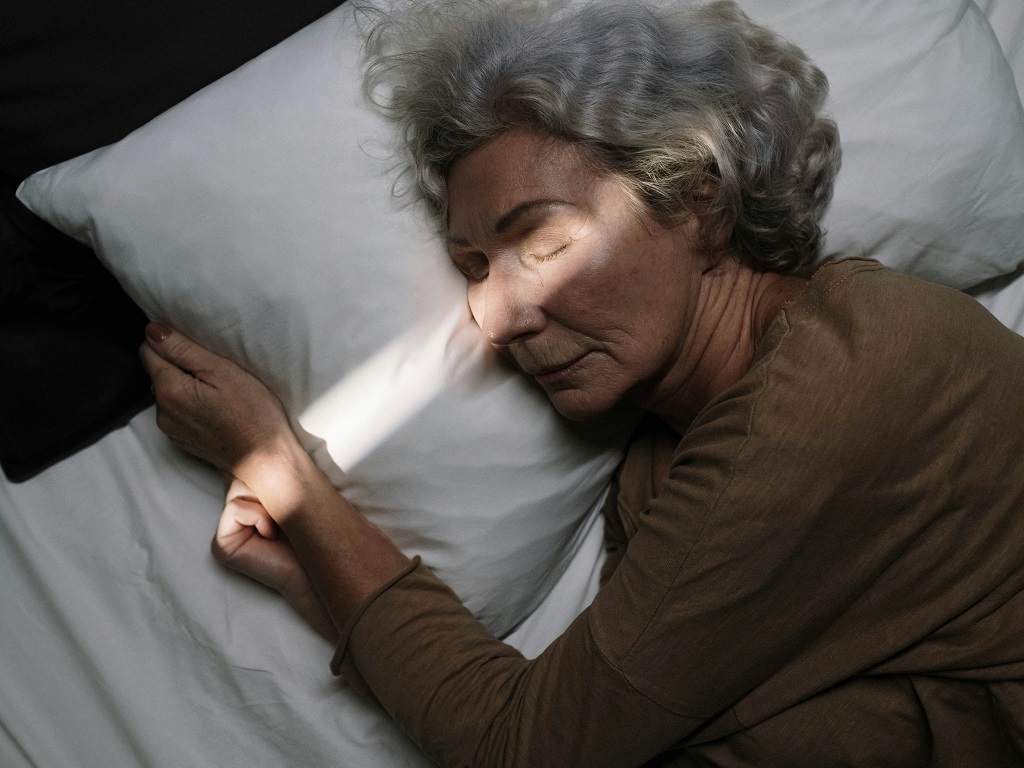Start your day with health news , readers can also read more articles: What to do if fever lasts more than 24 hours and doesn't go away?; Walking is great but be careful of these issues...
How much sleep do people over 50 need?
By the time you turn 50, most people will go to bed earlier than they did in their 20s or 30s. However, they may have a harder time falling asleep. In fact, older adults’ sleep needs are no different than when they were younger.
Quality sleep will help the brain rest and maintain the ability to concentrate the next day. Health and mood are also improved thanks to good sleep.

People over 50 years old still need to sleep 7-9 hours/night
For adults, whether young or old, the optimal amount of sleep is 7-9 hours/night. However, some people will need a little more sleep, while others need less. For people over 50, getting the full 7-9 hours/night is not easy.
The National Institute on Aging says that people over 50 are more likely to have insomnia. Even if they don’t have insomnia, they may still have trouble falling asleep and waking up in the middle of the night. Studies show that people over 50 tend to have lighter sleep patterns. They also spend less time in the deep sleep stage, which is when the body recovers the most.
Not only that, their circadian rhythms also change and start earlier in the day. This is why older people often wake up earlier, even though they sometimes don't want to. Readers can read more about this article on the health page on September 20.
What to do if fever lasts more than 24 hours and does not go away?
If you have a fever, it usually goes away within 24 to 48 hours. Most fevers are mild. If the fever persists for several days, it is likely due to a bacterial, viral, or underlying illness.
Fever occurs when the body temperature exceeds 37 degrees Celsius. Prolonged fever will make the body tired and weak. In many cases, fever will be accompanied by symptoms such as headache and chills. In severe cases, the patient may also suffer from delirium.

If after 24 hours the fever does not subside or even gets higher, the patient should see a doctor.
A normal fever will go away on its own within 24 hours. However, some people may have a persistent fever that lasts 10-14 days. For mild fevers, you can use some over-the-counter medications to help the fever go away quickly.
For infants and children under 3 months of age, do not give any medicine without consulting a doctor before giving it.
The body will often sweat more when having a fever. Therefore, the patient needs to drink plenty of water to avoid dehydration. In addition to filtered water, the patient can also drink milk, coconut water and fruit juice. Plant-based juices also contain vitamins and many other beneficial nutrients, helping to strengthen the immune system.
If your fever does not subside after 24 hours or even gets higher, you should see a doctor immediately. In fact, fever is a normal response of the body to an infection, such as a cold or flu. The next content of this article will be on the health page on September 20 .
Doctor's advice: Walking is very good but be careful of the following issues
Walking is a great way to exercise. However, this simple exercise - if done too much - can still lead to problems such as sore feet, sore muscles, joint pain, swelling and shin pain.
Therefore, it is important to recognize the signs of too much walking, take precautions, and if symptoms persist or are severe, seek medical attention .
Here, Dr. Anuj Chawla, consultant - orthopedic specialist at CK Birla Hospital Gurugram (India), shares some precautions when walking for exercise that you need to follow.

Walking is a great way to exercise, but too much walking can cause many health problems.
Walking too much can cause a number of health problems, so it's important to recognize the signs of overexertion when walking to avoid injury and protect your overall health.
Here are some common problems that can occur due to walking:
Lower back pain. One health problem associated with walking is lower back pain, especially for people with poor posture or weak core muscles. The strain on the spine and lower back muscles from walking too much or even standing for long periods of time can cause pain that ranges from a dull ache to sharp pain .
Foot pain. Pain in the feet, especially the heels, arches, and toes, is an early sign of walking too much. Plantar fasciitis often occurs when hiking long distances without adequate rest stops or wearing improper footwear. Start your day with health news to see more of this article!
Source: https://thanhnien.vn/ngay-moi-voi-tin-tuc-suc-khoe-nguoi-tuoi-50-ngu-the-nao-de-khoe-185240919235918769.htm


![[Photo] National Assembly Chairman Tran Thanh Man attends the ceremony to celebrate the 1015th anniversary of King Ly Thai To's coronation](https://vstatic.vietnam.vn/vietnam/resource/IMAGE/2025/4/13/6d642c7b8ab34ccc8c769a9ebc02346b)
![[Photo] Touching images recreated at the program "Resources for Victory"](https://vstatic.vietnam.vn/vietnam/resource/IMAGE/2025/4/14/99863147ad274f01a9b208519ebc0dd2)



![[Photo] Children's smiles - hope after the earthquake disaster in Myanmar](https://vstatic.vietnam.vn/vietnam/resource/IMAGE/2025/4/14/9fc59328310d43839c4d369d08421cf3)





















![[Photo] National Assembly Chairman Tran Thanh Man attends the Policy Forum on Science, Technology, Innovation and Digital Transformation](https://vstatic.vietnam.vn/vietnam/resource/IMAGE/2025/4/13/c0aec4d2b3ee45adb4c2a769796be1fd)
































































Comment (0)